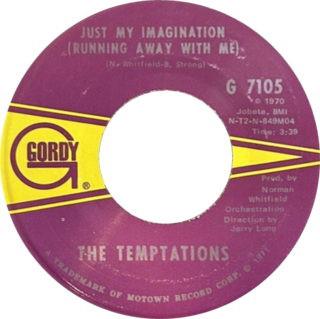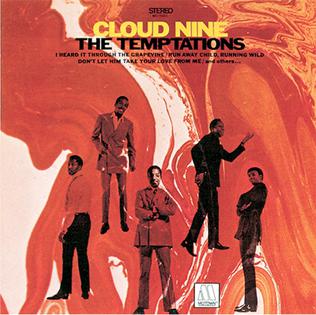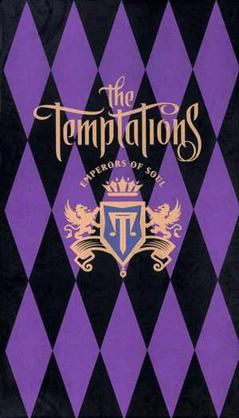
The Temptations is an American vocal group formed in Detroit, Michigan in 1960 as The Elgins, known for their string of successful singles and albums with Motown from the 1960s to the mid-1970s. The group's work with producer Norman Whitfield, beginning with the Top 10 hit single "Cloud Nine" in October 1968, pioneered psychedelic soul, and was significant in the evolution of R&B and soul music. The group members were known for their choreography, distinct harmonies, and dress style. Having sold tens of millions of albums, the Temptations are among the most successful groups in popular music.

"I Can't Get Next to You" is a 1969 No. 1 single recorded by the Temptations and written by Norman Whitfield and Barrett Strong for the Gordy (Motown) label. The song was a No. 1 single on the Billboard Top Pop Singles chart for two weeks in 1969, from October 18 to October 25, replacing "Sugar, Sugar" by the Archies and replaced by "Suspicious Minds" by Elvis Presley. The single was also a No. 1 hit on the Billboard Top R&B Singles for five weeks, from October 4 to November 1, replacing "Oh, What a Night" by the Dells, and replaced by another Motown song, "Baby I'm For Real" by the Originals.
"Psychedelic Shack" is a 1969 single for the Motown label performed by the Temptations and produced by Norman Whitfield. It became a hit single in 1970.

"Just My Imagination (Running Away with Me)" is a song by American soul group the Temptations, written by Norman Whitfield and Barrett Strong. Released on the Gordy (Motown) label, and produced by Norman Whitfield, it features on the group's 1971 album, Sky's the Limit. When released as a single, "Just My Imagination" became the third Temptations song to reach number one on the US Billboard Hot 100. The single held the number one position on the Billboard Pop Singles Chart for two weeks in 1971, from March 28 to April 10. "Just My Imagination" also held the number one spot on the Billboard R&B Singles chart for three weeks, from February 27 to March 20 of that year.
"Hum Along and Dance" is a soul song written for the Motown label by Norman Whitfield and Barrett Strong. Originally recorded by the Temptations, the song was later covered by Motown acts Rare Earth and the Jackson 5. The song is essentially an instrumental piece and a vehicle for scatting and improvisational vocals, since, as the chorus states, "ain't no words to this song/you just dance and hum along". All three versions of the song were produced by Whitfield.
"That's the Way Love Is" is a 1967 Tamla (Motown) single recorded by The Isley Brothers and produced by Norman Whitfield.

"Smiling Faces Sometimes" is a soul song written by Norman Whitfield and Barrett Strong for the Motown label. It was originally recorded by the Temptations in 1971. Producer Norman Whitfield had the song re-recorded by the Undisputed Truth the same year, resulting in a number-three Billboard Hot 100 position for the group. "Smiling Faces" was the only Top 40 single released by the Undisputed Truth, and was included on their debut album The Undisputed Truth.

Sky's the Limit is the fourteenth studio album by the Temptations, released in 1971 through Gordy Records. The album includes the #1 hit "Just My Imagination ", the Top 40 hit "Ungena Za Ulimwengu ", and the original version of "Smiling Faces Sometimes", later a Top 5 hit for The Undisputed Truth.

Solid Rock is the fifteenth studio album by The Temptations for the Gordy (Motown) label, produced by Norman Whitfield. The LP was the first made primarily without founding members and original lead singers Eddie Kendricks and Paul Williams. Frustrated by conflicts and fights with Temptations Otis Williams and Melvin Franklin, and producer Whitfield's steadfast insistence on producing psychedelic soul for the group when they really wanted to sing ballads, Kendricks had quit the act and negotiated a solo deal with Motown's Tamla label.

"Superstar (Remember How You Got Where You Are)" is a 1971 hit single for the Gordy (Motown) label, recorded by The Temptations and produced by Norman Whitfield. Something of an early ancestor to the "diss songs" prevalent in hip hop music towards the end of the 20th century, "Superstar" is an attack at two former Temptations members, David Ruffin (who had been fired back in 1968) and Eddie Kendricks (who quit the act in early 1971 and negotiated a Motown solo deal). The song appears on the 1972 album Solid Rock.

Meet the Temptations is the debut studio album by the Temptations for the Gordy (Motown) label released in 1964. It includes most of the group's early singles, excluding only the first, "Oh Mother of Mine", and its b-side, "Romance Without Finance" ; as well as the single "Mind Over Matter", in which the group is credited as The Pirates. The album consists entirely of previously released singles, including the group's first hit single, "The Way You Do the Things You Do".

Greatest Hits II is a 1970 greatest hits album for The Temptations, released by the Gordy (Motown) label. The sequel to the first Temptations greatest hits LP from 1966, Greatest Hits II collects several of the late-1960s hits that followed the release of the first compilation. Included here are the final collection of David Ruffin-led singles, including "(I Know) I'm Losing You", "I Wish It Would Rain" and "I Could Never Love Another ", and the first of the Dennis Edwards-led psychedelic soul records, including "Cloud Nine" and "Psychedelic Shack". A new non-album single, the #3 hit "Ball of Confusion ", is also included.

Cloud Nine is the ninth studio album by American musical group The Temptations for the Gordy (Motown) label released in 1969.

The Temptations Wish It Would Rain is the seventh studio album by the Temptations, released in 1968 via Gordy Records. It was the final release from the group's "Classic-5" era, during which David Ruffin, Eddie Kendricks, Paul Williams, Melvin Franklin, and Otis Williams constituted the Temptations' lineup.

Live at London's Talk of The Town is a 1970 live album recorded by The Temptations at the Talk of the Town nightclub in London, England. It was the final live album released by the group for over thirty years, until The Temptations in Japan, recorded in 1973, was released in 2004. The album reached No. 21 on the Billboard 200 Pop Album Chart, and No. 5 on its R&B album chart.

The Temptations' Christmas Card is a 1970 Christmas album by The Temptations for the Gordy (Motown) label. The album was released on October 30, 1970. It's also the group's first holiday release, it features each Temptation leading on various popular Christmas standards and original Christmas songs.

Emperors of Soul is a 1994 box set compilation for The Temptations, released by Motown Records. The five-disc collection covers the Temptations' entire four-decade history, from the first recording of The Distants in 1959 to four new recordings by the then-current Temptations lineup of Ali-Ollie Woodson, Theo Peoples, Ron Tyson, and stalwart members Otis Williams and Melvin Franklin.

Lost and Found: You've Got To Earn It (1962–1968) is a compilation album by The Temptations. Released by Motown Records in 1999, it includes twenty previously unreleased Temptations records alongside previously unreleased mixes of "Ain't Too Proud to Beg" and "You've Got to Earn It". Most of the songs were recorded during the group's "Classic 5" era with David Ruffin and Eddie Kendricks as lead singers, although there are some tracks present which were recorded with Ruffin's predecessor, Elbridge Bryant, in the lineup. There's also one track that was recorded with Ruffin's successor, Dennis Edwards.

"Cloud Nine" is a 1968 hit single recorded by The Temptations for the Motown label. It was the first of their singles to feature Dennis Edwards instead of David Ruffin in the lineup, was the first of producer Norman Whitfield's psychedelic soul tracks, and won Motown its first Grammy Award. The song was written by Whitfield and former Motown artist Barrett Strong.
"Farewell My Love" is a 1963 single by The Temptations for the Gordy (Motown) label. It was the last single that was written and produced by Motown president Berry Gordy for well over a decade, and the last released during the period of the "Original 5" lineup. It is also noted as the group's last single to miss the Billboard pop chart's Top 40 until 1971's "It's Summer". Up until now the group was jokingly referred to at this time as the "Hitless Temptations" by the Motown staff, much like their "sister" group, The Supremes, were called the "no-hit Supremes". However, their next single, the Smokey Robinson-produced "The Way You Do the Things You Do", would reach the Top 20 of the U.S. pop chart, breaking the group's streak of being "hitless".















